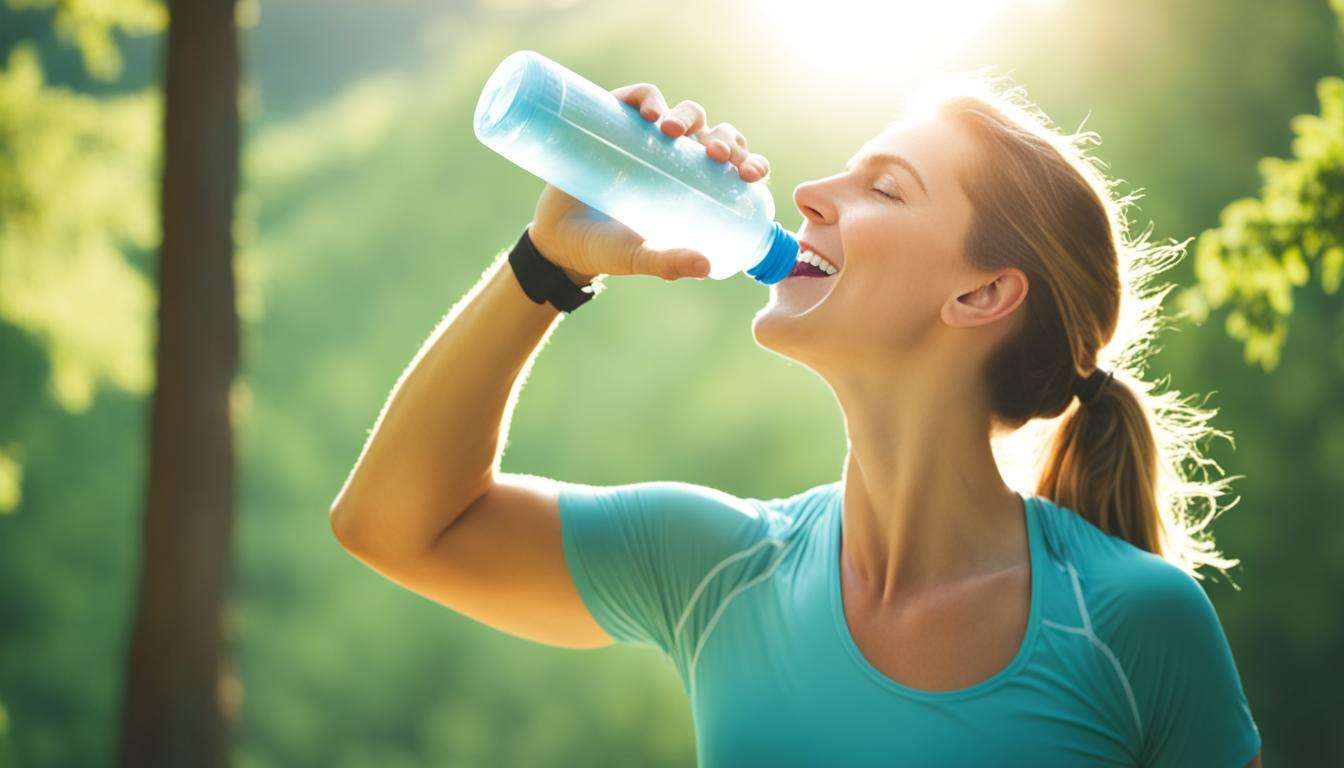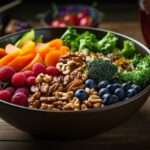Being hydrated is crucial for our overall well-being and has numerous benefits for our health. How to Make Hydration a Habit for Better Health? emphasizes the importance of staying hydrated, particularly during the summer when higher temperatures and humidity necessitate increased fluid intake. Water is identified as the optimal choice for daily hydration.
Jillian Wanik, a leading dietitian, suggests that women should aim for 11 cups of water per day, and men for 15 cups, including water from both liquids and foods. Implementing strategies such as starting early, consuming water-rich fruits and vegetables, maintaining a hydration log, infusing water with fruit, increasing intake during exercise, and always having a water bottle within reach are all practical steps outlined in “How to Make Hydration a Habit for Better Health” to ensure hydration becomes a regular part of your health routine.
Key Takeaways:
- Drinking enough water is crucial for improved health and overall well-being.
- During the summer, it is important to increase fluid intake due to higher temperatures and humidity.
- Women should aim for 11 cups of water per day, while men should aim for 15 cups, including water from liquids and food.
- Developing healthy hydration habits includes starting early, eating water-rich fruits and vegetables, keeping a hydration log, infusing water with fruit, drinking more during exercise, and carrying a water bottle.
- Prioritizing hydration is vital for staying healthy and enjoying the benefits of improved energy levels and overall well-being.
The Importance of Hydration for Performance and Energy Levels
Staying hydrated is crucial for optimal performance and maintaining energy levels. Proper hydration helps enhance your overall performance, whether you’re engaging in physical activities like running or carrying out everyday tasks. When you prioritize hydration, you’ll experience improved energy levels that keep you more alert, focused, and ready to take on the day.
By maintaining adequate hydration, you provide your body with the necessary fluids it needs to function at its best. When you’re properly hydrated, your muscles can perform optimally, minimizing the risk of fatigue, cramps, and muscle soreness. Adequate hydration also aids in the transportation of nutrients and oxygen to your muscles, promoting efficient energy production and preventing muscle fatigue.
Moreover, hydration plays a vital role in maintaining mental clarity and cognitive function. Dehydration can lead to decreased concentration, impaired memory, and reduced cognitive performance. By staying well-hydrated, you promote mental alertness, improve focus, and enhance your overall cognitive abilities.
Whether you’re an athlete striving for peak performance or an individual looking to stay productive throughout the day, hydration is key. It not only impacts your physical abilities but also influences your mental acuity and overall well-being.
| Benefits of Hydration for Performance and Energy Levels |
|---|
| Improved muscle function and reduced risk of fatigue |
| Enhanced oxygen and nutrient delivery to muscles |
| Maintained mental clarity and cognitive performance |
| Increased alertness, focus, and productivity |
Remember, staying hydrated goes beyond simply drinking a glass of water. Maintaining a consistent and balanced hydration routine throughout the day is essential to sustain your energy levels and optimize your performance. Make hydration a priority, and you’ll experience the benefits in both your physical and mental capabilities.
Recommended Daily Water Intake
Proper hydration is crucial for maintaining good health and overall well-being. The amount of water you should drink each day depends on factors such as your activity level, physical activity, and diet. It is essential to prioritize water intake throughout the day to meet your daily goals and stay properly hydrated.
According to recommended guidelines, women should aim for approximately 11 cups or 2.7 liters of water per day, while men should aim for about 15 cups or 3.7 liters. This total includes water consumed through both liquids and food.
Maintaining proper water intake is vital as it helps regulate body temperature, supports digestion, cushions joints, and aids in the transport of nutrients and oxygen throughout your body.
Stay hydrated and experience the benefits of adequate water intake for better health and well-being.
Factors Affecting Water Intake
Several factors influence your individual daily water intake needs. These factors include:
- Physical activity level: Engaging in more physical activity requires increased water intake to compensate for fluid loss through sweat.
- Environmental conditions: High temperatures, humidity, and altitude can increase fluid loss and the need for higher water intake.
- Diet: Consuming foods high in water content, such as fruits and vegetables, can contribute to overall hydration.
- Individual health conditions: Certain health conditions, such as kidney or urinary tract issues, may require adjustments to daily water intake. Consult with a healthcare professional for personalized recommendations.
By taking these factors into account, you can better understand your specific hydration needs and adjust your water intake accordingly.
| Factors | Recommended Daily Water Intake |
|---|---|
| Women | Approximately 11 cups or 2.7 liters |
| Men | Approximately 15 cups or 3.7 liters |
Remember, these are general recommendations, and individual needs may vary. It is always best to consult with a healthcare professional for personalized advice based on your specific circumstances and lifestyle.
Incorporate regular water consumption into your daily routine and ensure you meet your recommended daily water intake. You can set reminders on your phone or use a hydration log to track your progress and stay consistent in maintaining proper hydration levels.

Stay hydrated and make drinking water a healthy habit for a better, more energized you!
Tips for Developing Hydration Habits
Developing hydration habits takes time and consistency. To make hydration a natural part of your daily routine, consider implementing the following tips:
- Start Early: Begin your day by drinking a glass of water first thing in the morning. This kickstarts your hydration and sets a positive tone for the day ahead.
- Consume Water-Rich Fruits and Vegetables: Incorporate water-rich foods such as watermelon, cucumbers, and strawberries into your diet. These hydrating foods not only provide essential nutrients but also contribute to your overall fluid intake.
- Keep a Hydration Log: Track your daily water consumption by using a hydration log. This helps you monitor your progress and stay accountable to your hydration goals.
- Infuse Water with Fruit: Add flavor to your water by infusing it with slices of fresh fruits like lemon, lime, or berries. This not only enhances the taste but also makes drinking water more enjoyable.
- Drink More Water During Exercise: During physical activity, increase your water intake to compensate for fluid loss through sweat. Aim to drink water before, during, and after your workout to stay adequately hydrated.
- Carry a Water Bottle: Always carry a reusable water bottle with you throughout the day. This serves as a visual reminder to drink water and ensures that you have easy access to hydration wherever you go.
By implementing these tips, you can develop healthy hydration habits and prioritize staying hydrated for better overall health and well-being.
Quote:
“Water is the driving force of all nature.” – Leonardo da Vinci
| Tips for Developing Hydration Habits |
|---|
| Start Early |
| Consume Water-Rich Fruits and Vegetables |
| Keep a Hydration Log |
| Infuse Water with Fruit |
| Drink More Water During Exercise |
| Carry a Water Bottle |
Overcoming Challenges to Hydration
Working from home can pose challenges to staying hydrated, especially for those used to having easy access to water coolers. To overcome this, it is important to establish a routine and set reminders to drink water regularly.
One effective way to stay hydrated at home is by using smartphone apps that send reminders to drink water throughout the day. These apps can help you track your water intake and ensure you are meeting your hydration goals. By incorporating water breaks into your bathroom breaks, you can develop a habit of drinking water regularly.
“Drinking enough water, especially during hot summer days, is crucial for maintaining good health. It’s easy to forget about hydration when you’re caught up in the busyness of remote work. But by establishing a schedule and setting reminders, you can prioritize your hydration needs and stay healthy,” advises Lisa Smith, a certified nutritionist.
| Challenges | Overcoming Strategies |
|---|---|
| Limited access to water coolers | Set reminders to drink water regularly. Use smartphone apps to track and monitor your water intake throughout the day. |
| The monotonous taste of plain water | Use water filters or add slices of fruit, such as lemon or cucumber, to enhance the flavor of your water. Consider trying flavored sparkling water or diluted alternatives to replace sugary drinks. |
Improving the taste and quality of your water can also help overcome the challenge of monotonous plain water. Investing in a water filter or adding slices of fruit, such as lemon or cucumber, can enhance the flavor of your water and make it more enjoyable to drink. Alternatively, you can try flavored sparkling water or diluted alternatives to replace sugary drinks.
Remember that staying hydrated is not only important for your physical health but also for maintaining optimal cognitive function while working from home. By implementing these strategies and making hydration a priority, you can overcome the challenges of staying hydrated and ensure you are drinking enough water throughout the day.
Enhancing Hydration with Flavored Water
Plain water can sometimes be boring, leading to decreased intake. However, there are healthier alternatives to sugar-sweetened beverages. Flavored water infused with fruits or even sparkling water can be refreshing and enjoyable while still providing hydration. Experimenting with different flavors and finding what suits your taste can make drinking water more appealing and increase your overall intake.
Benefits of Flavored Water
Flavored water offers a tasty and hydrating alternative to plain water. By infusing water with fruits such as citrus slices, berries, or mint leaves, you can add a burst of flavor without the added sugars or artificial sweeteners found in sugary drinks. Additionally, sparkling water can provide a fizzy sensation that makes hydration more fun and enjoyable.
How to Make Flavored Water at Home
Creating delicious flavored water at home is simple. Follow these steps:
- Choose your favorite fruits and herbs. Citrus fruits like lemons, limes, and oranges are great options, as are berries like strawberries, blueberries, or raspberries.
- Wash and slice the fruits and herbs.
- Add the sliced fruits and herbs to a jug or bottle of water.
- Let the flavors infuse in the water for at least one hour in the refrigerator.
- Enjoy the refreshing taste of flavored water.
You can get creative and mix different fruits and herbs to find your perfect combination. Try combinations like cucumber and mint, strawberry and basil, or pineapple and coconut.
Flavored water infused with fruits or herbs is a delicious way to enhance hydration and make drinking water more enjoyable.
| Flavored Water Recipes |
|---|
| 1. Lemon and Mint Infusion |
| 2. Strawberry and Basil Delight |
| 3. Cucumber and Lime Refresher |
| 4. Watermelon and Mint Bliss |
| 5. Orange and Blueberry Burst |
Try out these flavorful recipes and discover your new go-to hydrating beverage!
Hydration and Exercise
During exercise, your body temperature and heart rate increase, causing you to sweat and lose fluids. It is important to maintain adequate hydration to prevent dehydration and its associated symptoms. Dehydration can lead to muscle cramping, fatigue, and decreased performance, impacting your workout effectiveness and overall exercise experience.
To stay hydrated during physical activity, follow these water intake guidelines:
- Drink 17-20 ounces of water 2-3 hours before your workout to ensure your body is adequately hydrated.
- Consume 8 ounces of water during your warm-up to prepare your body for the upcoming exercise.
- During the exercise, drink 7-10 ounces of water every 10-20 minutes to replenish fluids lost through sweating and maintain hydration.
- After your workout, drink 8 ounces of water within 30 minutes to aid in the recovery process and rehydrate your body.
By following these water intake guidelines, you can optimize your hydration levels during exercise and enhance your performance and overall exercise experience.

Tracking Hydration Intake
Keeping track of your hydration intake is essential to ensure you meet your daily goals. By monitoring your water consumption, you can stay on top of your hydration levels and make adjustments as needed. There are several effective methods for tracking your hydration, including using hydration logs, smartphone apps, and wearable technologies.
Hydration Logs
One way to track your hydration is by using a hydration log. These logs allow you to record the amount of water you consume throughout the day. By keeping a log, you can easily see if you are meeting your daily hydration targets and identify any patterns or trends in your water intake.
Here is an example of a simple hydration log:
| Time | Amount of Water Consumed (in ounces) |
|---|---|
| Morning | 8 |
| Before Lunch | 16 |
| Afternoon | 8 |
| Evening | 12 |
By consistently tracking your hydration intake in a log like this, you can assess your progress and make adjustments as needed to ensure you stay properly hydrated.
Smartphone Apps
Another helpful tool for tracking your hydration is using smartphone apps specifically designed for this purpose. These apps often provide features such as reminders to drink water, water intake tracking, and even personalized recommendations based on your individual needs.
Some popular hydration-tracking apps include:
- WaterMinder
- MyWater
- Hydro Coach
These apps make it easy to monitor your water intake throughout the day and stay accountable to your hydration goals.
Wearable Technologies
If you prefer a more hands-free approach to tracking your hydration, wearable technologies with hydration-tracking features can be a great option. These devices, such as smartwatches or fitness trackers, can provide real-time data on your hydration levels and progress throughout the day.
They often include features like hydration reminders, personalized recommendations, and even sensors that can measure your body’s hydration levels. With wearable technologies, you can have a constant visual reminder of your hydration goals and easily track your progress with just a glance at your wrist.
Whether you choose to use a hydration log, smartphone app, or wearable technology, tracking your hydration intake is a valuable tool to help you stay on top of your water consumption and ensure you meet your daily hydration goals. Find a method that works best for you and make monitoring your hydration a regular part of your routine.
Overcoming Water Taste and Odor Issues
For some, the taste or odor of water can be a deterrent to staying hydrated. Here are some tips to help you overcome water taste issues and improve the quality of your drinking water:
Invest in a Water Filter
If you find the taste of tap water unappealing, consider investing in a water filter for your home. A water filter can help remove impurities, such as chlorine or sediment, that may affect the taste and odor of your water. There are various types of water filters available, including pitcher filters, faucet filters, and whole-house filtration systems. Choose one that suits your needs and budget.
Try Sparkling Water
If you enjoy the carbonation of sugary drinks but want a healthier alternative, sparkling water can be a great choice. It provides the fizziness you crave without the added sugars and calories. Look for unsweetened sparkling water options or use a sparkling water maker at home to create your own refreshing carbonated beverages.
Dilute Sweet Drinks
If you find it hard to give up sugary drinks completely, try diluting them with water or ice. Adding water can help reduce the sugar content while still satisfying your taste preferences. Gradually decrease the amount of sugary drinks and increase the amount of water until you’re drinking mostly water with just a hint of flavor.
To sum up, overcoming water taste issues is essential for staying hydrated. Investing in a water filter, trying sparkling water, and diluting sugary drinks can help improve the taste and quality of your drinking water, making it easier to prioritize hydration over alternatives that are high in sugar and detrimental to your health.

Choosing the Right Water Bottle
Having the right water bottle is essential for staying hydrated throughout the day. Consider these factors when selecting a water bottle:
- Design Preferences: Choose a water bottle with features that align with your drinking preferences. Some options include a built-in straw for easy sipping or marked measurements to track your water intake.
- Durability: Look for a water bottle made from high-quality materials that can withstand everyday use. This will ensure your bottle lasts a long time and remains functional.
- Portability: Opt for a water bottle that is easy to carry with you wherever you go. Consider the size, shape, and weight of the bottle to determine its portability.
- Reusable: Choose a reusable water bottle to reduce plastic waste and promote sustainability. Reusable bottles are an eco-friendly alternative to single-use plastic bottles.
- High-Tech Options: If you prefer technology, there are water bottles available that can connect to your phone. These bottles track your water intake and provide reminders to stay hydrated throughout the day.
By selecting a water bottle that meets your needs and preferences, you’ll be more motivated to carry it and drink water consistently, leading to better hydration.
Individual Factors in Hydration Needs
The amount of water each person needs can vary based on individual factors such as health, activity level, environment, and other considerations. It is essential to consult with a healthcare professional to determine the most appropriate water intake level for your specific needs and to account for any medical conditions or medications that may affect hydration requirements.
Factors Affecting Water Intake:
- Health: Certain medical conditions such as kidney disease or diabetes may require specific hydration needs. Medications can also affect water requirements.
- Activity level: Individuals engaging in intense physical activity or exercise may need to increase their water intake to compensate for fluid loss through sweating.
- Environment: Hot and humid climates, as well as high altitudes, can increase water requirements to prevent dehydration.
- Body size and composition: A larger body size or higher muscle mass may require more water to maintain proper hydration.
- Pregnancy and breast-feeding: These stages of life may warrant increased water intake to support the body’s additional demands.
- Age: Infants, children, and older adults may have specific hydration needs due to their developmental stage or age-related changes in the body.
“Consulting with a healthcare professional is essential to determine your personalized water intake recommendations.”
Personalized Water Intake Recommendations
When it comes to individual hydration needs, there is no one-size-fits-all approach. Healthcare professionals can assess your specific circumstances and provide personalized water intake recommendations tailored to your needs. Factors such as medical history, current health conditions, and lifestyle factors will be considered to guide you towards optimal hydration.
Based on your factors, a healthcare professional may recommend a specific daily water intake goal, taking into account any necessary adjustments for your unique situation. These recommendations may be influenced by factors such as:
| Factor | Recommended Water Intake Adjustment |
|---|---|
| Pregnancy | Increased water intake during pregnancy to support the growth and development of the fetus. |
| Breastfeeding | Higher water intake to maintain milk production and stay properly hydrated. |
| Medical Conditions | Specific hydration recommendations to accommodate medical conditions such as kidney disease or diabetes. |
| Medications | Adjustments to water intake based on medications that may affect hydration levels. |
| Physical Activity | Increase in water intake to compensate for fluid loss during exercise or intense physical activity. |
| Environment | Higher water intake in hot and humid climates to prevent dehydration. |
Remember, these are just examples, and your personalized recommendations may vary based on your unique needs. Consulting with a healthcare professional is essential to determine your individual hydration needs and develop a hydration plan that supports your overall health and well-being.
Conclusion
Making hydration a habit is crucial for better health and overall well-being. By incorporating these tips into your daily routine, you can prioritize hydration and enjoy improved health and energy levels.
Start early by drinking water first thing in the morning to kickstart your hydration. Additionally, include water-rich fruits and vegetables in your diet to increase your fluid intake. Keeping track of your hydration with a log or smartphone app can help you stay on top of your goals.
Enhancing the flavor of water can make it more enjoyable to drink. Try infusing water with fruits for a refreshing twist, or opt for sparkling water as an alternative to sugary drinks.
Lastly, don’t forget to stay hydrated during exercise. Follow the recommended water intake guidelines and replenish lost fluids to prevent dehydration and maximize your performance.
Remember, it’s important to consult with healthcare professionals for personalized advice based on your individual needs and circumstances. Stay hydrated and enjoy the benefits of better health and well-being!
FAQ
How much water should I drink each day?
The recommended daily water intake is 11 cups for women and 15 cups for men. These totals include water from both liquids and food.
What are some tips for developing hydration habits?
Some effective tips include starting early by drinking water first thing in the morning, consuming water-rich fruits and vegetables, keeping a hydration log, infusing water with fruit for added flavor, drinking more water during exercise, and carrying a water bottle with you at all times.
How can I overcome challenges to staying hydrated?
To overcome challenges, establish a routine, set reminders to drink water regularly, use smartphone apps, incorporate water breaks into bathroom breaks, use water filters to improve taste, and replace sugary drinks with sparkling water or diluted alternatives.
Are there alternatives to plain water for hydration?
Yes, flavored water infused with fruits or even sparkling water can be refreshing and enjoyable while still providing hydration. Experimenting with different flavors can make drinking water more appealing and increase overall intake.
How much water should I drink during exercise?
The recommended water intake during exercise is 17-20 ounces 2-3 hours before, 8 ounces during warm-up, 7-10 ounces every 10-20 minutes during exercise, and 8 ounces within 30 minutes post-exercise.
How can I track my hydration intake?
You can track your hydration intake by using a hydration log, smartphone apps specifically designed for tracking water intake, or wearable technologies with hydration-tracking features.
What can I do if I don’t like the taste or odor of water?
Consider investing in a water filter for your home to improve taste, try sparkling water as an alternative for carbonation, or dilute sweet drinks with water or ice to reduce sugar intake while satisfying taste preferences.
What should I consider when choosing a water bottle?
When choosing a water bottle, consider design preferences (built-in straw, marked measurements), durability, and portability. Find a water bottle that suits your drinking preferences and carry it with you wherever you go.
How do individual factors affect hydration needs?
Factors such as health, activity level, environment, and other considerations can affect individual hydration needs. It is important to consult with a healthcare professional for personalized advice and to account for any medical conditions or medications that may affect hydration requirements.






